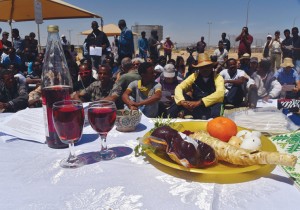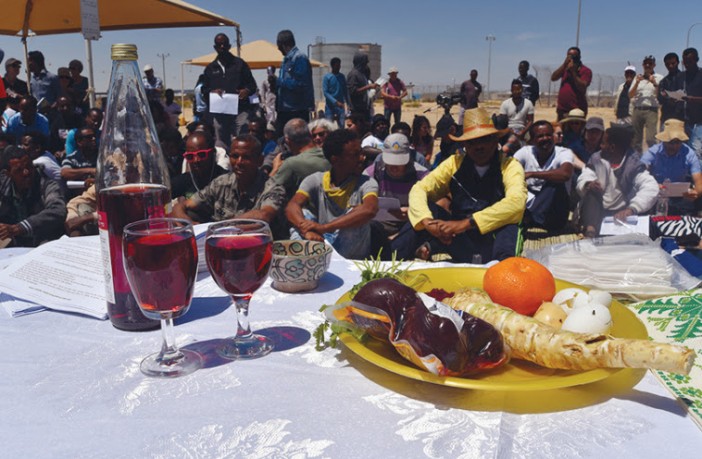Jerusalem Post
by Ben Hartman

This nostalgia persists despite the fact that out of a population of over 250,000 Jews in Morocco prior to the founding of Israel in 1948, only some 2,500 remain.
Everyone’s seen the pictures before – a politician wearing a fez, sitting in front of a pile of mufletot pastries, as well-wishers, perhaps a belly dancer or two, hover around bearing trays of sweets and mint tea in a development town somewhere in Israel.
The Mimouna, a traditional North African Jewish holiday marking the end of Passover, stopped being a holiday mainly for Maghrebi Jews years ago, becoming a sort of pan-Israeli Jewish occasion for partying and binging on sugary sweets. Along the way, Israeli politicians seized upon the holiday as a can’t-miss opportunity to press the flesh, and win hearts and minds among traditional Sephardi and Mizrahi voters. To put it differently, on the morning after Mimouna, it’s a safe bet you’re going to see a picture of Shimon Peres in a fez.
The stereotypes surrounding the Mimouna in Israel today are a stark departure from their North African traditions, according to Dr. Yehuda Maimran, CEO of the Alliance Israélite Universelle and a member of an Education Ministry committee, headed by Israel Prize laureate poet Erez Biton, that intends to strengthen Mizrahi identity in Israeli culture.
“Back in Morocco it was a Jewish holiday that Jews and Arabs would celebrate together. I was too young to remember but my parents would tell me about how everyone would open their houses and their Muslim neighbors would come bearing food and gifts. For us it was a holiday of love and opening your house to everyone.”
He said that his parents, like many Sephardi rabbis, were taken aback by the way many Israelis celebrated the Mimouna and its departure from more modest traditions.
As a means of connecting to this tradition, Alliance Israélite Universelle is helping organize dozens of Mimouna celebrations in cities across Israel, including ones at local youth centers in Beersheba and Kuseifa, which are intended to host a mixed crowd of Jews and Beduin.
He said that initially the Mimouna was seized upon by cynical politicians looking to win over Sephardi and Mizrahi voters, at giant celebrations with ear-splitting Middle Eastern music that were very different from the intimate open-door family tradition back in North Africa. Over the years, as it became less identified with a particular ethnicity or segment of society, the political aspect receded and it began morphing into more of a pan-Israeli, or at least pan-Sephardi holiday.
Maimran was born in Morocco in a small village outside Casablanca, where his father ran a yeshiva and his mother was a teacher. In 1965, at the age of three, he immigrated to Israel with his parents and four siblings, living in the periphery and later moving to Jerusalem.
He says that the traditional Mimouna represents not only a proud heritage, but also “the belief that someone can be a citizen who loves Israel and the Land of Israel and also the non-Jewish residents of the state.”
Within his narrative of the Mimouna tradition is a sort of a nostalgic look at the history of the North African Jewish communities, where, though they were a minority that often faced discrimination and problems from their Muslim neighbors, lived side-byside with gentiles.
This nostalgia persists despite the fact that out of a population of over 250,000 Jews in Morocco prior to the founding of Israel in 1948, only some 2,500 remain.
Maimran said that this sort of good neighborly aspect of Moroccan Jewish life can be seen in how some Moroccans have taken to viewing the Mimouna as part of their overall national heritage. He noted the 2007 founding of the “Mimouna Club,” a student club launched by a group of non-Jewish students at Al-Akhawayn University in the city of Ifrane, Morocco, to celebrate the country’s Jewish heritage.
He also sees this history in the warm reception he said he received when visiting his childhood home with his siblings two years ago, and in the way the older residents of the house remembered his parents and spoke fondly of them.
In the future, the Mimouna celebrations will most likely evolve comfortably within Israeli mainstream, though hopefully, as Maimran sees it, in a way that stays true to the history of Moroccan Jewry.
“There is a very rich Jewish world and history in Morocco, prior to their coming to Israel, and we are in a period where these things are slowly being recognized and understood,” he said.







